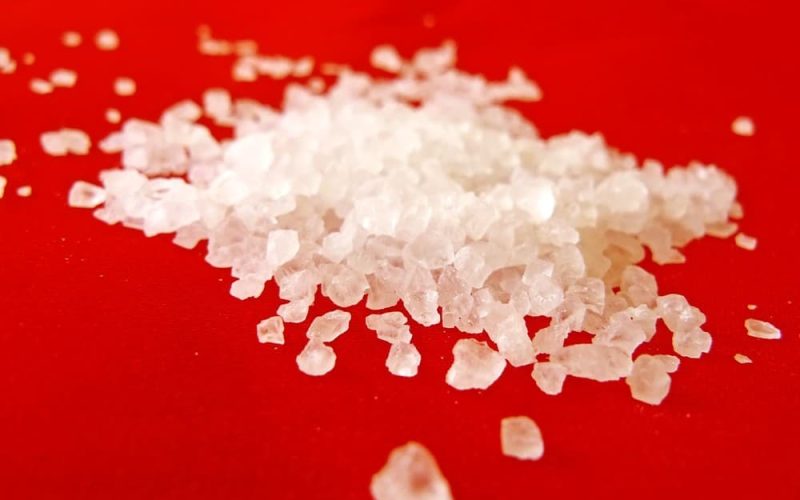Chromium is a chemical element that is hard and brittle. It is needed by your body in trace amounts for healthy functioning. There are a lot of benefits chromium bestows on the body.
This essential element plays a critical role in the insulin-signaling pathways. This allows your body to control the amount of sugar you take in, it balances the amount of glucose in the blood and produces stable energy.
This vital mineral protects your DNA chromosomes from damage. It halts cell mutations that cause chronic diseases. Chromium has also been associated with longevity and improved heart functions because it metabolizes fats and other nutrients.
There are two types of chromium; we have the biologically active form, also known as trivalent chromium (chromium 3+), and it is found abundantly in foods.
The second type is the hexavalent chromium (chromium 6+) which is unsafe and toxic to humans. This type is not consumed but used in industrial applications. It is not found in foods though it can contaminate water.
Chromium 6+ has been linked to cancer and many other health problems. Chromium 3+ is naturally found in whole plant foods, certain meats, whole grains, potatoes, vegetables, and brewer’s yeast.
Plants pick up chromium from soil and rocks on which they grow. It enters our bodies when we eat such crops. Chromium is also present in drinking water in little amounts. Stainless-steel cookware contains chromium also and cooking in them can supply chromium to your body.
Important Health Benefits of Chromium
Prevents diabetes
Chromium controls blood sugar thereby preventing diabetes. It enhances the role of insulin in the body, a critical hormone that helps take glucose into your body cells where it is used for energy.
A deficiency in this important nutrient leads to diabetes. Chromium also promotes healthy metabolism. It enhances the storage of nutrients in your body and helps you absorb and distribute nutrients better.
Brewer’s yeast which is a rich source of chromium helps in sugar metabolism. It prevents glucose intolerance, the formation of diabetes, and insulin resistance.
Chromium supplements have to be combined with other intervention methods for the treatment of diabetes.
Controls the levels of cholesterol
The normal metabolism of fats depends on chromium. High intake of chromium from plant foods makes your blood vessels and heart-healthy. It moderates the levels of cholesterol in the body.
Studies have shown that people who die from heart disease are low in chromium at the time of their death.
Prevents overeating and weight gain
Obese people are given chromium picolinate supplements to help control their food intake and weight. Also, people who are at risk of obesity can take this on a doctor’s prescription. It reduces weight and reduces your risk of obesity.
The mechanism of action at which chromium reduces weight is not yet known but many studies have revealed that higher consumption of chromium-rich foods is associated with a reduction of fat accumulation in the body.
Protects your brain
Healthy insulin response promotes brain health and cognitive functions even down to your old age. Chromium effectively controls glucose functions and metabolism, thus promoting brain health.
Chromium is an indirect modulator of brain functions and it also reduces age-related diseases of the brain. This important element leads to healthier functions of the hypothalamus.
The hypothalamus is an important part of the brain that controls your body temperature, appetite, sleep, thirst, and even your emotions. Chromium keeps this part of the brain in a more youthful state.
It also helps regulate appetite in aging individuals. It also prevents the negative effects of aging on the neurons of your brain. Other parts of the brain like the thymus and the pineal gland benefit from chromium too. These parts are also affected by insulin control.
Improves skin health
Quick changes in levels of sugar in the bloodstream cause skin problems like acne. Since chromium helps to balance glucose levels in the blood, this helps your skin indirectly.
Chromium-rich foods also contain other important nutrients like antioxidants, phytochemicals, and others that protect your skin and improve its health.
Improves energy levels
Since chromium supports a healthy metabolism, this helps increases your levels of energy. Active people or their work demands them to be active will gain a lot of energy if they consume chromium-rich foods.
This will improve your performance at work and in life, it will also help your muscle functions. People who are eating less food to reduce their body weight need to include lots of chromium-rich foods in their diet for energy.
This will also help to make up for the chromium you lose through urine and sweats. Chromium-rich foods will also keep your metabolism running smoothly and healthy.
Boosts eye health
Chromium protects your eyes. It prevents age-related eye disorders like macular degeneration and even glaucoma. People who are deficient in chromium develop glaucoma, a leading cause of irreversible blindness today.
Glaucoma is also related to diabetes and it is characterized by the build-up of fluids in the eyes. This also causes pressure on delicate tissues of the eyes like the optic nerves, lens, and retina.
If this is not treated, it can lead to blindness over time. Chromium controls blood glucose thereby helping to prevent glaucoma.
Improves bone health
Chromium prevents the loss of calcium from the body thereby helping to maintain strong bones. This also reduces your risks of osteoporosis and fractures.
It prevents bone loss and bone disorders which are common in older women. This helps to reduce the risks of osteoporosis. Chromium supplements are also given to osteoporosis patients and this element is a natural remedy for osteoporosis.
Prevents depression
Chromium helps the body in manufacturing serotonin, the happiness hormone. It triggers the release of this hormone and another neurotransmitter called norepinephrine, the feel-good hormone.
These two molecules help to control your mood, keep you in a happy and positive mood, and fight depression. These biochemicals are also used to make antidepressant medications because of their powerful mood-lifting properties.
Also, high levels of sugar wreak havoc in your body. This will affect your mind, your emotions, and even your energy levels. Chromium regulates the levels of glucose in your bloodstream, this, in turn, will reduce mood swings and increase your mental performance.
It will also reduce your cravings for carbs, refined sugar, and help you not to overeat.
Recommended Daily Intake of Chromium
The Institute of Medicine of the National Academy in 1989 developed and established the dietary reference intake of chromium. These levels are for healthy people (people who have no obvious symptoms of disease).
But the exact amount of chromium needed by your body depends on your weight, the level of your physical activity, and your current state of health.
Below are the recommended intake based on gender and age:
- 2 micrograms for infants 0 to 6 months
- 5 micrograms for children aged 7 to 12 months
- 11 micrograms for children aged 1 to 3 years
- 15 micrograms for children aged 4 to 8 years
- 25 micrograms for boys aged 9 to 13 years
- 21 micrograms for girls aged 9 to 13 years
- 35 micrograms for teen boys aged 14 to 18 years
- 24 micrograms for girls aged 14 to 18 years
- 35 micrograms for men aged 19 to 50 years
- 25 micrograms for women aged 19 to 50 years
- 30 micrograms for pregnant women
- 35 micrograms for breastfeeding women
- People with diabetes need 200 micrograms of chromium daily
- People with metabolic syndrome and type II diabetes need 1,000 micrograms daily
Natural Sources of Chromium
Chromium is found in most plant foods, however, some of the richest sources of chromium in nature are
- Whole wheat and its products (including refined ones)
- Brewer’s yeast
- Broccoli
- Raw onions
- Grapefruits and grape juice
- Romaine lettuce
- Grass-fed beef
- Ripe tomatoes
- Potatoes
- Green peppers
- Bananas
- Mushrooms
- Basil
- Prunes
- Apples
- Asparagus
- Garlic
- Nuts
- Red wine
- Eggs
- Oranges and orange juice
- Spinach
- Green beans
- Black pepper
- Turkey raised in nature
- Organic butter
- Nickel pots and pans
- Corn
- Stainless steel cookware
- Some beers
- Lentils
Foods high in sugar (like fructose and sucrose) are very low in chromium. Sugar reduces the absorption of chromium. Foods rich in vitamin C and B (thiamine) increase the absorption of chromium in the intestine.
Signs and Symptoms of Chromium Deficiency
Chromium is present abundantly in whole wheat products like bread and cereals. You can also find chromium in refined carbohydrates which is consumed more than whole wheat products.
This is one of the reasons why chromium deficiency is not common. But chromium deficiency still exists and affects a lot of people today. People with glaucoma are deficient in this mineral.
Some of the signs of chromium deficiency are:
- Poor control of glucose levels
- Delayed healing of wounds or recovery from surgeries
- Very weak bones and worsened levels of bone loss
- Slow development and stunted growth
- Low levels of energy and constant fatigue
- Abnormal changes in weight
- Poor skin health and dull complexion
- Changes in appetite and food intake
- High risks of heart complications and abnormal levels of cholesterol
- Moodiness and mood changes like anxiety
- Poor memory and inability to concentrate
- Poor eye health and sight problems like glaucoma
Causes of chromium deficiency are strenuous exercise, alcoholism, and malnutrition.
How Safe Are Chromium Supplements?
There are many controversies surrounding the intake of chromium supplements. It is still questioned by some medical experts because studies done on these supplements show mixed results.
Since only a little amount of chromium is needed by the body, you don’t need supplements except you have a chronic disease that needs chromium supplements like diabetes and glaucoma.
The amount of chromium present in plant food is enough if you are not chronically ill. And if you have a chronic disease, you should consult with a doctor first before attempting to take chromium supplements.
There are many brands and many forms of chromium supplements in the market, so you need the guidance of medical personnel to prescribe a good one for you.
Some common forms of chromium supplements are chromium picolinate and chromium polynicotinate. There are also many types, some come as part of a multivitamin, or chromium-based supplements in form of capsules or tablets.
Food sources are the best way to get your chromium except you have an underlying medical condition. If you eat lots of plant foods, you are already getting a good amount of chromium.
Also, with supplements, one can be at risk of chromium toxicity and this has serious side effects. Chromium toxicity is rare when you take only plant foods because even if you take enough of plant foods, your body only picks out little chromium and excrete the rest.
But it is easy to have chromium toxicity from supplements especially if you take it in large doses or for a very long time. Lots of chromium can enter your cells and cause DNA damage.
Even if chromium supplements are prescribed for you, take it according to the dose, do not overdose on it, and also take it for a short time.
Side Effects of Chromium Supplements
High levels of chromium found in supplements can cause adverse side effects. They can also interact with medications and cause health complications or worsen already existing medical conditions.
Chromium toxicity which is only caused by supplements can cause:
- Digestive problems e.g. stomach pain
- Low blood sugar
- Organ damage e.g. liver, heart, and kidneys
- It can affect heartbeat and nerve signaling
- Itching
- Stomach irritation
- Flushing
- Irritability and mood swings
- Headaches
- Sleep disorders
Always stick to the dose and tell your doctor that you don’t intend to take this for a long time. People who are anemic and people who have kidney or liver problems should be careful with this supplement.
References;
- Chromium; Drugs.com
- Side effects of chromium EWG, NCBI,
- Chromium and diabetes NCBI, NCBI, NCBI, NCBI, NCBI, NCBI, NCBI, NCBI, NCBI,
- Chromium and cholesterol and lipids NCBI, NCBI,
- Chromium and appetite NCBI,
- Chromium and brain health NCBI, NCBI,
- Chromium and energy NCBI,
- Symptoms of chromium deficiency NCBI,
- Chromium and obesity NCBI, NCBI, NCBI, NCBI,
- Chromium and bone health NCBI,
- Chromium and PCOS and hormonal imbalance NCBI,









